Related Research Articles

Dario Argento is an Italian film director, screenwriter and producer. His influential work in the horror genre during the 1970s and 1980s, particularly in the subgenre known as giallo, has led him to being referred to as the "Master of the Thrill" and the "Master of Horror".

Carlo Gesualdo da Venosa was an Italian nobleman and composer. Though both the Prince of Venosa and Count of Conza, he is better known for writing madrigals and pieces of sacred music that use a chromatic language not heard again until the late 19th century. He is also known for killing his first wife and her aristocratic lover upon finding them in flagrante delicto.

Rumors di mercato: grande scambio Cesena Piacenza. Chiarello Piacentini Klinsmann per Doria Maricone e Recino. A Cesena mancano solo le sentenze.

In Italian cinema, giallo is a genre of murder mystery fiction that often contains slasher, thriller, psychological horror, psychological thriller, sexploitation, and, less frequently, supernatural horror elements.

Lamberto Bava is an Italian film director. Born in Rome, Bava began working as an assistant director for his director father Mario Bava. Lamberto co-directed the 1979 television film La Venere d'Ille with his father and in 1980 directed his first solo feature film Macabre.

Emanuele Severino was an Italian philosopher.

The House on the Edge of the Park is a 1980 English-language Italian exploitation horror film written by Gianfranco Clerici and Vincenzo Mannino, and directed by Ruggero Deodato. It stars David A. Hess and Giovanni Lombardo Radice as two criminals who infiltrate a posh gathering in a villa and violently turn against the partygoers after they mock them. The film is a loose remake of The Last House on the Left (1972), in which Hess also starred.
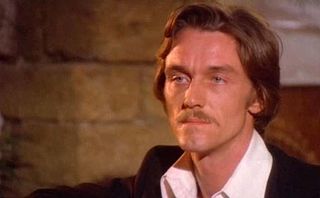
John Steiner was an English actor. Tall, thin and gaunt, he attended the Royal Academy of Dramatic Art and performed on-stage for the Royal Shakespeare Company, but was best known to audiences for his roles in Italian films, several of which became cult classics.
Dardano Sacchetti is an Italian screenwriter who often worked with Italian directors Lamberto Bava and Lucio Fulci.
Gianni Baget Bozzo was an Italian Catholic priest and politician.

Tenebrae is a 1982 Italian giallo film written and directed by Dario Argento. The film stars Anthony Franciosa as American author Peter Neal, who – while in Rome promoting his latest murder-mystery novel – becomes embroiled in the search for a serial killer who may have been inspired to kill by his novel. John Saxon and Daria Nicolodi co-star as Neal's agent and assistant respectively, while Giuliano Gemma and Carola Stagnaro appear as detectives investigating the murders. John Steiner, Veronica Lario, and Mirella D'Angelo also feature in minor roles. The film has been described as exploring themes of dualism and sexual aberration, and has strong metafictional elements; some commentators consider Tenebrae to be a direct reaction by Argento to criticism of his previous work, most especially his depictions of murders of women.

Poliziotteschi constitute a subgenre of crime and action films that emerged in Italy in the late 1960s and reached the height of their popularity in the 1970s. They are also known as polizieschi all'italiana, Italo-crime, spaghetti crime films, or simply Italian crime films. Influenced primarily by both 1970s French crime films and gritty 1960s and 1970s American cop films and vigilante films, poliziotteschi films were made amidst an atmosphere of socio-political turmoil in Italy known as Years of Lead and amidst increasing Italian crime rates. The films generally featured graphic and brutal violence, organized crime, car chases, vigilantism, heists, gunfights, and corruption up to the highest levels. The protagonists were generally tough working class loners, willing to act outside a corrupt or overly bureaucratic system.

Lorenzo Ferrero is an Italian composer, librettist, author, and book editor. He started composing at an early age and has written over a hundred compositions thus far, including twelve operas, three ballets, and numerous orchestral, chamber music, solo instrumental, and vocal works. His musical idiom is characterized by eclecticism, stylistic versatility, and a neo-tonal language.
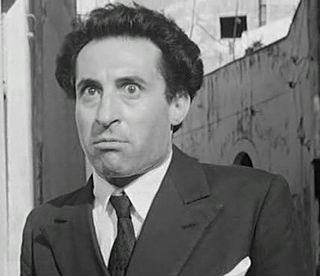
Leopoldo Trieste was an Italian actor, film director and script writer.
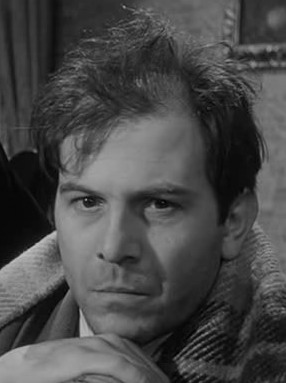
Enrico Maria Salerno was an Italian actor, voice actor and film director. He was also the voice of Clint Eastwood in the Italian version of Sergio Leone's Dollars Trilogy films, and the voice of Christ in The Gospel According to St. Matthew directed by Pier Paolo Pasolini.
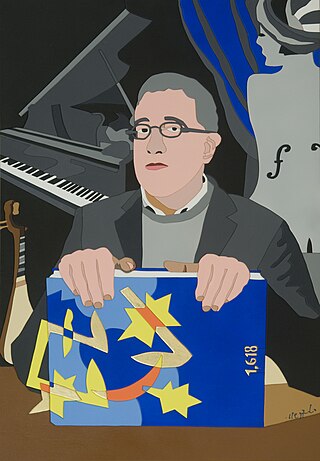
Giulio Castagnoli is an Italian composer.
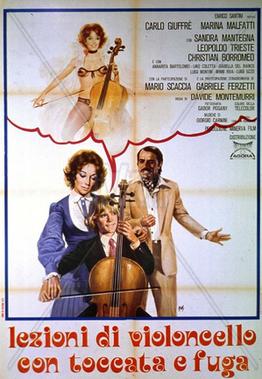
Lezioni di violoncello con toccata e fuga is a 1976 commedia sexy all'italiana film. It stars actor Gabriele Ferzetti.
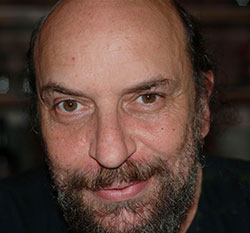
Maurizio Guarini is a self-taught keyboardist, multi-instrumentalist and composer, best known as a member of the progressive rock band Goblin.

Flavio Emilio Scogna is an Italian composer and conductor.
The 2019–20 season was Società Sportiva Dilettantistica Palermo's 1st season in Serie D, the fourth-highest division of Italian football, in their history, after the exclusion of the club from Serie B in summer 2019. However, this was the second time that Palermo participated in the fourth division: in the 1987–88 season the sicilian club played in Serie C2, after a year passed outside of any football league, because of bankruptcy in 1986.
References
- ↑ Milano-Firenze, Mo-Net s.r.l. "Christian Borromeo | MYmovies". www.mymovies.it. Retrieved 2018-08-14.
- ↑ Milano-Firenze, Mo-Net s.r.l. "Filmografia Christian Borromeo | MYmovies". www.mymovies.it. Retrieved 2018-08-14.
- 1 2 3 4 5 "Christian Borromeo | Actor". IMDb. Retrieved 2024-08-11.
- 1 2 "Tenebre (Film, 1983) - Futuro Europa". Futuro Europa (in Italian). 2018-08-08. Retrieved 2018-08-14.
- 1 2 Macmillan, Joshua (2016-10-27). "Dario Argento's Tenebrae (1982): A Retrospective Review". Dread Central . Retrieved 2018-08-14.